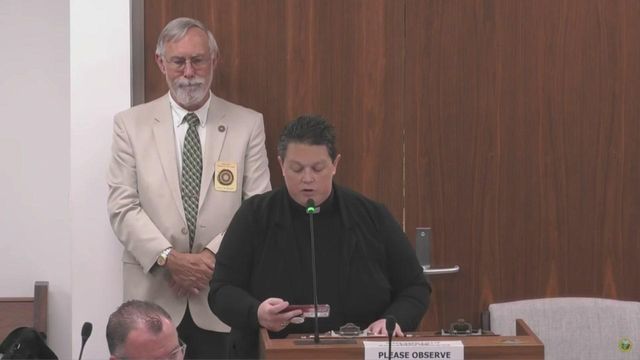NC speaker's campaign has paid his law firm almost $70k for rent, watchdog group says

A government watchdog group is calling on the North Carolina State Board of Election to clarify North Carolina’s campaign finance rules and crack down on candidates who make money renting office space to their own campaign.
In a letter to the board on Monday, the Campaign for Accountability flagged about $70,000 in payments that state House Speaker Tim Moore’s political campaign has paid on a building he owns, which also houses his law office in Kings Mountain. The left-leaning group used public campaign finance records to arrive at its total.
Moore, R-Cleveland, says he had no choice: State law requires his campaign to kick in for rent, and for his legal secretary's time when it’s soaked up by campaign duties. Because his law firm is organized as an S corporation — a tax designation for private companies — anything else would constitute an illegal campaign donation, since businesses aren’t allowed to donate money or services to candidate committees.
“This is just a left wing group that’s trying to make political attacks on me because I’m a Republican,” Moore said. “All I can do is function under the laws that we have.”
Washington, D.C-based Campaign for Accountability hasn’t asked the state board for an investigation, nor has it suggested that Moore is violating state law. State code forbids a candidate’s campaign from paying rent on a residential property the candidate owns, but there’s no corresponding rule for commercial property.
The Campaign for Accountability says there should be.
“Using contributions to personally financially benefit candidates or public officials seems to violate the spirit if not the letter of the law,” the group said in its letter. “It also seems unlikely that by enacting a rule specifically barring candidates and officials from using contributions to pay rent or mortgages on residential property, the board intended to carve out an exception allowing candidates to use contributions to pay rent or mortgages on commercial property they own or control.”
The Campaign for Accountability tallied $69,300 in payments for the office since 2010, though Moore’s campaign paused payments for a couple of years. The monthly amount has varied, but stands now at $1,500, paid to “Tim Moore Attorney at Law,” according to Moore’s latest campaign finance reports.
Most of those payments appear in campaign finance records solely as rent, others as rent and staff time. Moore said that years ago his campaign tracked the time his law firm staff spent on political issues, but it abandoned that as too complicated and settled on the flat $1,500 fee. Moore noted that his campaign has been audited by the State Board of Elections in recent years and the board never complained about the rent payments, which are clearly marked in campaign finance records.
State Board of Elections spokesman Pat Gannon didn’t immediately comment on the group’s letter Monday. He has previously confirmed that, while state code forbids campaign payments for residential property owned by the candidate, it doesn’t speak to commercial property. Gannon has also confirmed corporations can’t donate and that “this includes a ban on in-kind contributions such as use of office space.”
“If a business owns the office space used by the campaign, the committee must pay fair market value for the space used,” he previously said.
In its letter, the Campaign for Accountability questioned whether Moore is paying above fair market value to use just a portion of the office’s 1,274 square feet.
After Moore told WRAL News that much of the monthly payments cover staff time, Campaign for Accountability Executive Director Michelle Kuppersmith said Moore should note that more clearly in campaign records, and that his campaign should account for the hours his legal staff spends on campaign work.
"At the very least it appears that Moore was engaged in sloppy financial accounting,” she said.
Kuppersmith’s group didn’t request a State Board of Elections investigation. Instead, it wants the board to issue an advisory opinion. If the board issues one it will be public record, but these opinions are typically requested by a campaign that needs guidance about its own spending, not by a third party, so it’s not guaranteed that the board will issue one.
Moore isn’t the only elected official whose campaign has paid for office space owned by the candidate or an entity in which they seemingly have an interest. State Senate leader Phil Berger’s campaign used to pay towards his law office in Eden, writing checks to The Berger Law Group. Now it pays $2,000 a month to Woodall Properties, in which Berger doesn’t have a financial interest, according to a Berger spokesman.
Berger is the reason it’s illegal in North Carolina for a campaign to pay rent on a residence the candidate owns. That rule changed in 2020 following complaints that Berger’s donors were paying for his Raleigh townhouse.









